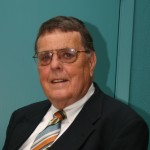 Dean Justice, CFE, knows his way around the sprawling University of Texas at Austin campus. But ever since Justice retired in 1990 from overseeing the Frank Erwin Center that he opened in 1977, one particular area has become especially near and dear to him: the archives of the Briscoe Center for American History, where the history of IAVM and the touring entertainment industry can both be found.
Dean Justice, CFE, knows his way around the sprawling University of Texas at Austin campus. But ever since Justice retired in 1990 from overseeing the Frank Erwin Center that he opened in 1977, one particular area has become especially near and dear to him: the archives of the Briscoe Center for American History, where the history of IAVM and the touring entertainment industry can both be found.
“This is basically the home for our history,” said Justice, who served as IAVM chairman (president) in 1974-75 and was awarded the Charles A. McElravy Award in 1987. “This is where you can find documentation of so much of our past and some of the earliest people who helped shape what we are today.”
How much history is preserved here, you may ask? According to part of the descriptive summary in the IAVM Collection, how about 47 feet and 8 inches.
A recent visit to Austin afford an opportunity to meet with Justice, who bears no official title but serves as an unofficial dean (pardon the pun) to the archives. The visit included a tour to the off-campus site that houses archives from around the world, many of which date back four centuries and more.
“How much history is preserved here, you may ask? According to part of the descriptive summary in the IAVM Collection, how about 47 feet and 8 inches.”
Relative humidity is balanced with temperature to yield the optimum setting for the preservation of documents which arrives as books, posters, magazines, newspapers, hand-written letters and much more. Those articles sent which might have mold, bacteria or even the wayward cockroach wedged between pages are placed in a freezer room for 30 days for purification and cleansing before they go on the shelves. Suffice to say the operation is much more elaborate than just a simple hand-off exchange to immediately be placed on the shelves.
Back on campus, the Briscoe Center for American History near the LBJ Library is where one can go to view archived materials. Specifically, the Reading Room is open to the public 35 hours per week and offers online find aids, digitized images and forms for requesting information and offsite materials – all on the website.
IAVM contributed recently to the archive following an all-day cleaning out at headquarters. In fact, the IAVM Collection can be accessed online.
Archival preservation, according to Justice, is about much more than sentimental reflection on periods of history.
“We research based quite a bit on history and use that history to formulate plans going forward,” he said. “Years from now, people in the industry will be researching on what we are doing today. This is really helpful and just makes more sense for people to donate to the archives instead of just letting sit around.”
If you are unsure whether your donation might be appropriate for the collection, Justice said that he is happy to field inquiries to help facilitate the decision. Contact him at 512-507-4648 or by email at d.justice@utexas.edu. Be sure and read the full story and interview with Dean Justice in an upcoming issue of Facility Manager magazine.

Kudos to Dean Justice for keeping our IAVM Association legacy alive with the archives at the Brisco Center for American History. All of us have some history associated with our particular venue either at home in files or at the office. The responsible thing to do if you are not ready to part with the mementos or history is to at least label the material to be donated to the IAVM archives at the Center for American History at the University of Texas at Austin. That way, if someone else has to clean out your attic or basement, they won’t throw it away because it doesn’t have any meaning for them.
We have had quite a few colorful characters in our past history that have been instrumental in paving the way for the successful IAVM we enjoy today. Going forward, we’ll continue to have events, innovations and other changes that will influence how we do business. We should make effort to preserve our history and locate in the information in one place. That place is the Brisco Center for American History at the University of Texas – Austin.
David B. Ross, CFE